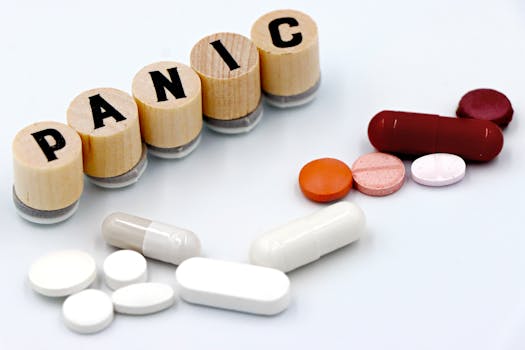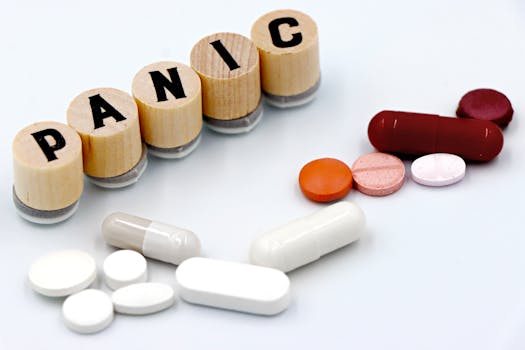Many people weigh medication alongside therapy when deciding how to reduce the intensity and frequency of panic episodes. One clear option to discuss with your clinician is panic attack medication, which can provide rapid relief for some symptoms while other strategies build long-term resilience.
Meds for panic attacks: common options and what the evidence says
Clinicians typically consider a few categories of drugs to treat panic attacks. Selective serotonin reuptake inhibitors (SSRIs) and serotonin–norepinephrine reuptake inhibitors (SNRIs) are often first-line because of strong trial evidence and tolerability. Benzodiazepines can stop a panic attack fast for acute relief, but they carry risks of sedation and dependence. Beta-blockers may help with physical symptoms like racing heart. When asking about the best drug for panic attacks, the answer depends on medical history, symptom pattern, and patient preference.
How these medications work and what to expect
SSRIs/SNRIs typically take several weeks to reach full effect for panic disorder, while benzodiazepines work within minutes to hours and are sometimes prescribed only for breakthrough panic. Your prescriber will discuss side effects, interactions, and whether short-term or maintenance therapy is appropriate. Evidence supports combining medication with cognitive behavioral therapy for more durable gains.
Practical coping: combining medication with skills and techniques
Medication is rarely the only tool. Panic attack coping skills and panic attack techniques—like focused breathing, grounding, and cognitive reframing—help people manage symptoms and reduce future episodes. If you need immediate strategies, learning ways to stop a panic attack fast is useful; for longer-term goals, integrating coping techniques for panic attacks with meds often yields the best outcomes.
Below are some practical actions and phrases you might find helpful in the moment or in planning care:
- Practice slow diaphragmatic breathing to counter hyperventilation.
- Use grounding: name five things you see, four you can touch, three you hear.
- Distract yourself during a panic attack with a simple task (counting, holding ice, or walking).
- Create a plan with support people for what to do after a panic attack so recovery is smoother.
When to use medication versus skills
People often ask whether medicine for panic is necessary. For frequent or disabling panic disorder, meds for panic attacks can reduce recurrence and severity. For isolated or situational panic, panic attack tips and behavioral practice may suffice. Discuss options like meds for panic attacks, therapy, or both with a trusted clinician.
How to help someone and how to help yourself during an attack
Knowing how to calm someone down from a panic attack or how to help someone with a panic attack can make a big difference. Stay calm, speak slowly, encourage controlled breathing, and avoid minimizing the experience. If you’re the person experiencing symptoms, techniques on how to calm anxiety panic attacks and how to end a panic attack often overlap: focus on breathing, grounding, and reminding yourself that the episode will pass.
If shaking is a prominent symptom, additional guidance can be found on strategies for tremor management and recovery—see an article with practical steps at how to stop shaking from anxiety.
Common questions people ask about stopping panic
There are many related concerns: how to stop panic attacks forever, how to stop waves of panic attacks, and how to eliminate panic attacks forever. While “forever” is a strong claim, consistent treatment (therapy plus medication when indicated), lifestyle adjustments, and relapse prevention planning greatly reduce recurrence and improve quality of life.
Choosing treatment and safety considerations
Discuss the full list of drugs to treat panic attacks with your prescriber, including potential interactions with alcohol and other medications. If considering benzodiazepines, ask about dependency risk and alternative strategies to stop a panic attack. If you have medical conditions or are pregnant, specific medicine for panic choices will differ—always consult your clinician.
Simple takeaway steps
- Talk to a clinician about whether meds for panic attacks are right for you.
- Learn panic attack coping skills and panic attack techniques that you can use immediately.
- Use a clear plan for what to do after a panic attack so you recover faster.
FAQ
Q: How do you calm down from an anxiety attack quickly?
A: Use slow diaphragmatic breathing, grounding, and remind yourself the panic will pass; if prescribed, a fast-acting medication can also help stop a panic attack fast.
Q: What should I do when someone is having a panic attack?
A: Stay calm, speak in a reassuring voice, guide them through breathing, offer a seat and water, and avoid telling them to “snap out of it.” If symptoms are severe or persist, seek medical help.
Q: Where can I read evidence-based information about panic disorder?
A: A reputable source is the National Institute of Mental Health’s page on panic disorder: NIMH overview of panic disorder.






